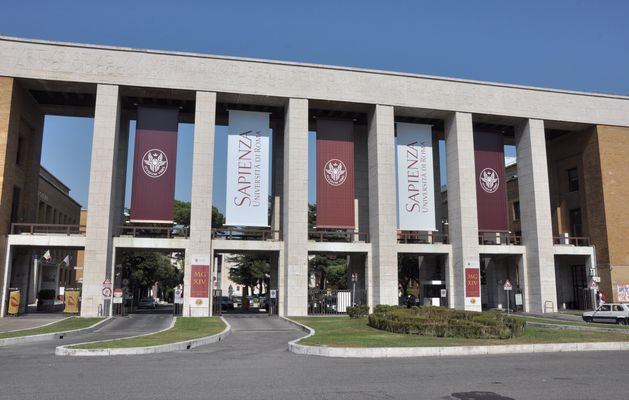The texture of suffering is changed when we see it and begin to experience it as being redemptive.
 Photo: Wikimedia Commons.
Photo: Wikimedia Commons.
“But don’t you think life is worth all the suffering we go through?” I was surprised by my own question, wondering myself if life was indeed worthy, compared to the pain and evil there is in the world.
It was a bright afternoon, in the campus of Sapienza, Rome’s and Europe’s largest university. I had been talking for some good 20 minutes with a student, and she was sharp.
We had moved through the problems of faith, religious exclusivism, stagnant Catholicism, and now she zeroed in on what seemed like the most central obstacle for her, the problem of suffering.
“You only believe this is a good world because you grew up in a good home, with parents who loved you”, said she. Her eyes had sparkled until that moment, but now she faced the floor. “Others of us were not so lucky, and I don’t think life is worth all the pain we go through”.
“I’m sorry about that…”, was the best I could say. Then she cited statistics on sexual abuse, and the percentage of abuse cases that take place within the household. Though she talked in general terms, I read between the lines that this must have been her case too.
Her father or an uncle had mistreated her as a child, and these experiences darkened her whole view of life.
We talked for some minutes more, but her remark struck me, as I walked back home. Is life worth it?
Desmond Tutu, a Nobel Peace laureate for his work during South Africa’s apartheid, has wrestled with the same question. He has seen more suffering and injustice than most of us, yet his response is striking.
There very well may be times when God has regretted creating us, but I am convinced that there are many more times that God feels vindicated by our kindness, our magnanimity, our nobility of spirit.
He arrives at this conclusion with two reasonings. The first is that behind our notion of evil lies the eloquent horizon of goodness which permeates our world and minds. “For every act of evil there are a dozen acts of goodness in our world that go unnoticed… It is only because we believe that people should be good that we despair when they are not.”[i]
We would not call evil evil, in other words, or be angry at it, if we did not know also what goodness is. If the believer struggles to explain evil, the skeptic faces an ever tougher challenge to explain goodness.
Tutu’s second argument for the validity of our imperfect existence is, in my view, even more telling. “The texture of suffering is changed when we see it and begin to experience it as being redemptive, as not being wasteful, as not being senseless. We humans can tolerate suffering but we cannot tolerate meaninglessness”.
I imagine Tutu learned this in his struggle against the apartheid, and that he saw the faces of his colleagues change from anger to purposefulness when they heard about redemption, and imagined how their pain could be used for good.
“This is what I mean when I say we can transform our suffering into a spirituality of transformation by understanding that we have a role in God’s transformation of the world.” [ii]
Is this imperfect world worth it? In many cases we feel like it is not, for sure. Tragedies like the Middle East massacres this month must nauseate God too. But I think that, in the end, life is worth it. It is worth seeing children playing in the playground, though they dispute each other’s toys.
It is worth seeing a young couple brush one another’s hair, though they may break off the next week. It is worth seeing an honorable man die, and cherish the legacies he has left behind. There are moments when pain hits us so hard that we prefer death, or the undoing of the world.
I guess the validity of the world is a question of perspective, like that girl put it. But we will only be able to judge if our existence was worth it when we see it as a whole, good things and bad things included, at the twilight of this age. And no one has articulated our hope better than Dostoevsky:
I believe like a child that suffering will be healed and made up for, that all the humiliating absurdity of human contradictions will vanish like a pitiful mirage, like the despicable fabrication of the impotent and infinitely small Euclidean mind of man, that in the world’s finale, at the moment of eternal harmony, something so precious will come to pass that it will suffice for all hearts, for the comforting of all resentments, for the atonement of all the crimes of humanity, of all the blood that they’ve shed; that it will make it not only possible to forgive but to justify all that has happened.[iii]
I hope in the end to see that Dostoevsky’s vision will indeed be true, and that I can see evil redeemed like Tutu does. And I hope that that student sees it too, sees the engulfing of her suffered past in God’s ocean of redemption, and says, “Yes, it hurt, it hurt real bad. But life is worth it.”
[i] Desmond Tutu, quoted in Francis Collins, Belief: Readings on the Reasons for Faith (New York: HarperOne, 2011), 152-3.
[ii] Ibid., 156.
[iii] Fyodor Dostoevsky, The Brothers Karamazov, quoted in Timothy J. Keller, The Reason for God: Belief in an Age of Skepticism (New York: Dutton, 2008), 33.

Las opiniones vertidas por nuestros colaboradores se realizan a nivel personal, pudiendo coincidir o no con la postura de la dirección de Protestante Digital.
Si quieres comentar o